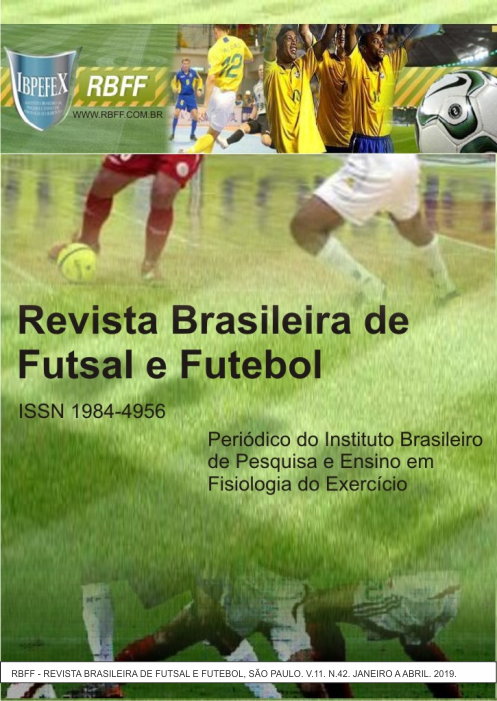Training of football coaches in Brazil: challenges for the professional qualification programs of the brazilian football offered by CBF
Abstract
The present work aimed to analyze the training processes of football coaches in Brazil based on the professional qualification programs offered by the Brazilian Football Confederation (CBF). It is characterized as being a descriptive / exploratory research of bibliographical and documentary character. For the data collection procedures, information about the National School of Football Coaches offered by the Brazilian Football Confederation (CBF) was extracted directly from the institution's website. The results indicate that Brazil has followed a worldwide trend in the creation of national schools of coaches, but still some points need to be better discussed such as the high values of the courses, the geographical distribution as well as the schedules destined for the formations. It is concluded that the formal and non-formal training processes of trainers are important objects to be thematized and reflected within the scientific field.
References
-Brasil. Lei nº 8.650, de 20 de abril de 1993. Dispõe sobre as relações de trabalho do Treinador Profissional de Futebol e dá outras providências. Documento Oficial da União, Brasília-DF, 22 de abril de 1993.
-Brasil, V. Z.; e colaboradores. A formação profissional para treinadores de surf no Brasil. In Nascimento, J. V.; Souza, E. R.; Ramos, V.; Rocha, J. C. S. (Orgs.). Educação Física e Esporte: convergindo para novos caminhos... Florianópolis. Editora da UDESC.2015. p. 357-382.
-Confederação Brasileira de Futebol. 2015. Disponível em: <https://www.cbf.com.br/>. Acesso em: 20/08/2015.
-Confederação Brasileira de Futebol. 2017. Disponível em:<http://www.cbf.com.br/cbfacademy/pt/home/>. Acesso em: 16/08/2017.
-Equipe UF. 2015. Disponível em: <https://universidadedofutebol.com.br/>. Acesso em: 15/04/2015.
-Gallati, L.; e colaboradores. Coaching in Brazil Sport Coaching as a Profession in Brazil: An Analysis of the Coaching Literature in Brazil From 2000-2015. International Sport Coaching Journal. Vol. 3. p. 316-331. 2016.
-Gil, A. C. Como elaborar projetos de pesquisa. 2ªedição. São Paulo. Atlas. 2002.
-International Council for Coaching Excellence (ICCE). International Sport Coaching Framework Version 1.2. Champaign. Human Kinetics. 2013.
-Lyle, J. A review of the research evidence for the impact of coach education. International Journal of Coaching Science. Vol. 1. Núm. 1. p. 17-34. 2007.
-Mesquita, I.; Jones, R.; Fonseca, J.; De Martin Silva, L. Nova abordagem na formação de treinadores: O que mudou e porquê? In: Nascimento, J.; Farias, G. (Org.) Construção da identidade profissional em educação física: da formação a intervenção. Colecção Temas em Movimento. Florianópolis. 2012. p. 41-60.
-Milistetd, M.; e colaboradores. Coaching and Coach Education in Brazil. International Sport Coaching Journal. Vol. 1. p. 165-172. 2014.
-Talamoni, G. A.; Oliveira, F. I. S.; Hunger, D. As configurações do futebol brasileiro: análise da trajetória de um treinador. Revista Movimento. Vol. 19. Núm. 1. p. 73-93. 2013.
-Tozetto, A. V. B. Desenvolvimento profissional de treinadores de futebol: perspectiva de aprendizagem ao longo da vida. Dissertação de Mestrado. Programa de Pós-Graduação em Educação Física da Universidade Federal de Santa Catarina. Florianópolis. 2016.
-Universidade do Futebol. Especial: a importância da formação do treinador de futebol. 2017 Disponível em: <https://universidadedofutebol.com.br/especial-a-importancia-da-formacao-do-treinador-de-futebol/>. Acesso em: 16/08/2017.
-Werthner, P.; Culver, D.; Trudel, P. An examination of a large scalecoach education program from a constructivist perspective. In: Schinke, R. (Ed.) Sport Psychology Insights. London. Nova Science Publishers Inc., 2012. p. 337-354. 2012.
Authors who publish in this journal agree to the following terms:
- Authors retain the copyright and grant the journal the right of first publication, with work simultaneously licensed under the Creative Commons Attribution License BY-NC which allows the sharing of the work with acknowledgment of the authorship of the work and initial publication in this journal.
- Authors are authorized to enter into additional contracts separately for non-exclusive distribution of the version of the work published in this journal (eg, publishing in institutional repository or book chapter), with acknowledgment of authorship and initial publication in this journal.
- Authors are allowed and encouraged to post and distribute their work online (eg, in institutional repositories or on their personal page) at any point before or during the editorial process, as this can bring about productive change as well as increase impact and impact. citation of published work (See The Effect of Free Access).





